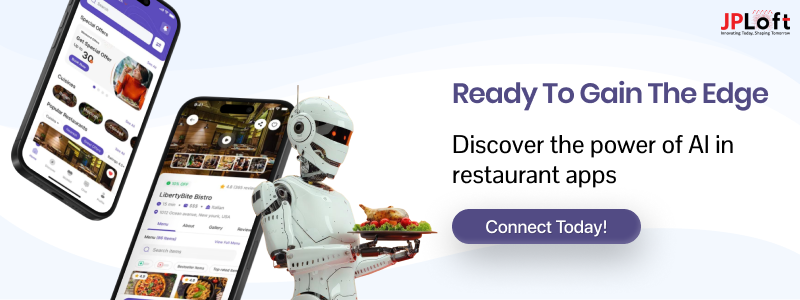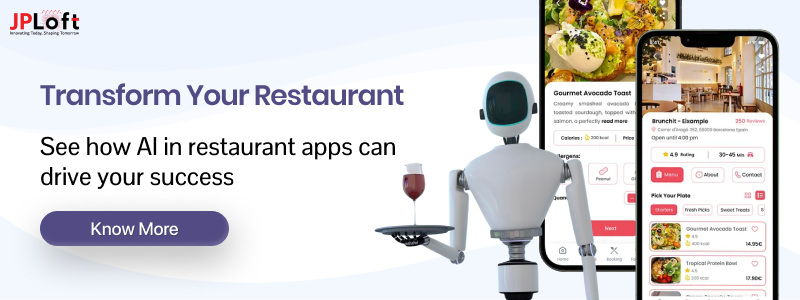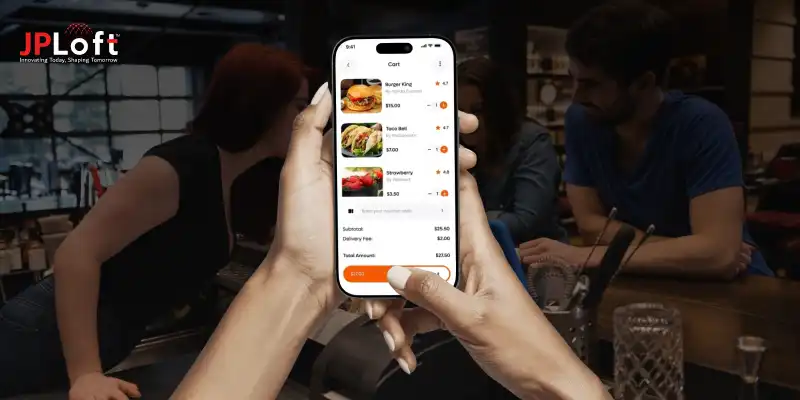Worried about how to proceed with the trend?
Not anymore.
With the changing technologies, boosting growth can be a challenge for many entrepreneurs in the restaurant industry.
The use of AI in restaurant apps is not a new phenomenon, it's an approach that you should adopt after analysing the requirements of your restaurant business.
You must be aware of AI, however, its implementation differs based on the priorities for your app.
In this blog, you will learn it all from the concept of AI implementation in restaurant apps, steps, reasons, and much more.
Let’s begin together.
About AI in Restaurant Apps: Concept
AI in restaurant apps can be defined as the integration of artificial intelligence to enhance various aspects of the app, from user experience to operational efficiency.
This consisted of personalized recommendations, an optimized ordering procedure, and even automated kitchen management.
Additionally, AI leads to inventory management, controlling the dynamic pricing, predictive analytics, voice ordering, data analysis, and reporting, personalized customer management, self-serve options, and much more in restaurant apps.
Well, without understanding the current scenario of the market, you cannot be able to know the AI implementation and its consequences.
Hence, let’s check out more about the restaurant apps and their related market stats here.
-
The global online food delivery market, comprising both grocery and meal delivery, is projected to reach a significant revenue of $1.85 trillion by the year 2029.
-
Revenue is expected to grow at an annual growth rate of 7.64%, resulting in a projected market volume of US$ 2.0 trillion in the year 2030.
-
According to the restaurant market statistics, the market size of the global online food delivery sector is estimated at over 1 trillion U.S dollars in the year 2023, of which 630 billion dollars was generated in the grocery delivery segment.
-
The restaurant delivery market is projected to reach US$ 156.96 billion in 2025. This is projected to grow to US$ 173.84 billion by 2030.
-
In the restaurant delivery market, the number of users is expected to amount to 1.5 billion users by the year 2030.
These were some of the stats that you need to follow before you integrate AI into the restaurant apps.
Let’s discover the scenario of AI before and after its implementation in the given section.
Restaurant App: Before and After AI Implementation
Prior to implementing artificial intelligence in restaurant apps, you should know what happens when you proceed without AI.
Here is the table to cover it all.
|
Aspect |
Before AI |
After AI |
|
Scheduling |
Manual booking is prone to errors |
AI reduces cancellations by 15% |
|
Personalization |
Generic services for all |
88% of clients prefer AI-based personalized recommendations |
|
Customer Interaction |
In-person or phone only |
82% of young users prefer AI-powered virtual consultations |
|
Operational Efficiency |
High manual workload |
AI cuts front-desk work by 50+ hours/month |
|
Data Use |
Rarely used for insights |
AI analyzes feedback with 92% accuracy |
|
Market Growth |
Steady, tech-light industry |
Expected to reach $2.5B by 2025 |
Still confused about why implement artificial intelligence in restaurant apps?
You can consider the next section.
Why Integrate AI in Restaurant Apps?
Do you know why you should integrate Artificial Intelligence into restaurant apps?
Yes, in the current era, with technological advancements, it has become important to walk with innovation.
Following the current restaurant app trends not only helps in learning about what’s happening or what technology is leading the market, but it also helps in improving the user experience with the brand.
When it comes to artificial intelligence in restaurant apps, it helps in evaluating the current preferences of actual users in the competitive market.
Let’s learn about the importance of AI technology in restaurant apps below.
A] Efficient Inventory Management
AI implementation can analyze a vast amount of historical sales and data, which helps to empower the restaurants to make data-driven decisions.
With the help of AI, restaurants can optimize the stock levels, predict demand, and reduce wastages via various techniques, including predictive analysis.
B] Data Mining
AI revolutionizes data and helps to evaluate the current market scenario and the demands of the users related to their food preferences.
This is a tool of AI that helps process the complex, unstructured data, including images, text, and audio.
C] Reduces Cancellations and Errors
AI automates the restaurant apps, which helps businesses reduce manual errors and improve the functioning of the systems.
It helps in validating data, and to analyze information for making useful predictions, and identifying potential issues even before they take place.
D] Improves Decision-Making
With the help of AI, you can analyze complicated data sets and may identify patterns that humans might miss, thus providing a more informed basis for making accurate decisions.
AI technology in restaurant apps can automate the risks, personalized recommendations, and simulate scenarios to make decisions related to food and restaurant options for dining in.
E] Helps to Predict Future Trends
AI in the restaurant industry can automate repetitive tasks, freeing up the business owners and decision-makers to focus on more strategic and complex issues.
Additionally, AI integration in restaurant apps allows businesses to forecast human needs, optimize operations, and make informed decisions based on real-time insights.
F] Real-Time Predictive Analytics
Advancements in restaurant apps can enable real-time data collection and processing for instant predictions.
This feature also helps users to evaluate the current waiting and booking scenarios for dining in these restaurants.
Now, as you are ready to implement AI in restaurant apps, it is vital to evaluate the key AI features that you can implement to enhance the complete performance of your apps.
Let’s learn them all in the next section.
Key AI Features for Restaurant Apps
To build a restaurant app, it becomes crucial to add useful AI features.
AI features are those that help in adopting functionalities and capabilities of AI systems, which help them to perform tasks that require human intelligence.
Let’s learn about key AI features that you can integrate into the restaurant apps here.
1. Chatbots
AI-driven chatbots can be defined as virtual assistants that offer personalized menu recommendations to users and help in analyzing past orders, delays in bookings, and much more.
These chatbots provide automated customer interactions, help in streamlining the processes, and enhance the dining experience among users.
2. Order Tracking and FAQs Systems
If a user orders from their favorite restaurant apps, then with the help of AI, users can identify real-time tracking of their favorite food.
This tracking feature in the restaurant apps helps in monitoring the food quality, enhancing supply chain management, and enhancing transparency from farm to table.
3. Customer Feedback Analysis
Through integrating artificial intelligence into restaurant apps, you can evaluate the current customer feedback and use it to enhance the functions and operations of the app.
With the help of AI, you can identify the areas of improvement, recognize opportunities for innovation, and make data-driven decisions. Adding feedback is an important restaurant app feature, and adding AI to it can help you in analyzing what users are looking for.
4. Predictive Ordering
The AI-powered predictive ordering is changing the way restaurants handle customer orders and is able to manage wait times.
Furthermore, it helps in streamlining operations, which ultimately reduces wait times and improves the overall user experience.
5. Workflow Optimization
Through apps, you can evaluate the current workflow scenarios in your restaurants. From ordering to processing and till order fulfillment.
It helps in streamlining processes, reducing errors, and freeing up human resources for more strategic activities.
6. Enhances Scalability
AI helps the restaurant apps scale up tasks by automating activities. It further helps in enhancing scalability and flexibility among apps.
It leads to improved efficiency, reducing costs, and results in increased customer satisfaction. This enables a reduction of costs and increases customer satisfaction.
7. Sentiment Analysis
With the use of AI, you can evaluate the sentiments of the users, identify trends, pinpoint areas for app improvement, and make data-driven decisions for enhancing the customer service of your business.
AI tools can assess the user's emotions that are conveyed in substantial text inputs, such as customer reviews and related feedback.
8. Boosting Response Efficiency
AI technology in the restaurant apps helps identify the user's accurate demands and provide them with what they are looking for on time.
Yes, your aim should be to engage the users for the long term on your app; however, if they feel confused or identify that these apps take a prolonged time to book dining or their favorite food, they might switch to another platform.
Well, till now, we have discussed the concept of AI implementation, current stats, reasons to integrate, and features.
Now, it's time to look at how you can implement AI in restaurant apps.
Let’s check out the following section, quickly.
How to Integrate AI in Restaurant Apps?
In this competitive world, it's important to know the right steps for building your dream restaurant apps.
Here are a series of steps that you can count.
Step 1: Define the Objectives
Before you implement AI in restaurant apps, it's vital that you define the key objectives for integrating it.
You should be well aware of the key results and benefits that your app will get after implementing AI.
Additionally, you should conduct a deep market research and evaluate what competitors are currently pursuing for attracting and engaging potential users.
Step 2: Select the Right AI Features
Now, it's time to evaluate the different features that you can include in your dream app. You should know that not all AI features are meant to be integrated into your app.
These features can include real-time monitoring, chatbots, order tracking, predictive ordering, sentiment analysis, and many others.
Hence, you should select the AI features based on your project objective and the results they will provide for boosting your restaurant business growth.
Step 3: Choose the Right AI Tools
It's essential to select the AI platforms, tools, and APIs that will fit the overall architecture of your app.
Here, you can select various AI tools such as Google Cloud AI, Azure AI, and Amazon Sagemaker for effective machine learning.
Along with this, you should evaluate Dialogflow or IBM Watson for the chatbot integration.
Step 4: Discuss Your AI Expectations with Developers
If you are not an expert with the core technical details to integrate AI in the restaurant apps, then it's vital to discuss AI expectations with the developers.
You can hire dedicated developers who know the process well to integrate artificial intelligence as a key technology for your app.
With these experts, you can discuss all the crucial details related to features, the project's aim to achieve, and other important details.
Step 5: Collect and Organize Data
Now, you should include the quality data in your app. In this scenario, you can evaluate the AI quality and the types of data you provide.
Under this step, you implement features as order history, customer feedback, inventory logs, as well as reservation patterns.
Thereafter, with the help of AI, you can streamline operations and analyze this large amount of data effectively.
Step 6: Integrate With Backend
Integrating AI with backend systems involves incorporating intelligent algorithms to enhance functionality and automate complex tasks.
Here, you can select prebuilt APIs/services including OpenAI, Google Cloud AI, AWS AI/ML services, and Microsoft Azure Cognitive services.
Along with this, you can discuss your project initiatives with the developers, who can help you with the code to install AI in your app.
Step 7: Monitor and Test
Now, it's time to test your AI implementation in restaurant apps and determine whether it's effective in addressing your key objectives or not.
You should conduct rigorous testing for your app. Here, you can focus on a multi-faceted approach. This comprises testing for usability, security, performance, and the overall customer experience.
Here, you can assess the app’s user friendliness and how it reacts when actual users operate it.
These were some of the important steps that you should concentrate on while creating your dream app with AI.
Let’s cover the case studies of the leading apps that have implemented AI for restaurant apps in the section presented below.
Real-World Case Studies for Restaurant Apps AI Implementation
Learning about top restaurant apps adopting and implementing AI can help you ensure success.
Well, when we look at how our competitors are doing after adopting AI, it can help boost your growth in the market.
Here’s what competitors are doing.
► Case Study 1: OpenTable
OpenTable is a restaurant booking app that helps users schedule their dining. The platform integrates tools like PolyAI and Slang.ai.
These tools help the restaurants to customize a voice that helps the business to handle inbound calls, guide diners via the reservation procedure, and helps to answer common users' queries.
Hence, the cost to build an app like OpenTable varies due to its complicated AI features and the types of technologies that this app implements.
► Case Study 2: Yelp
Yelp is a popular app that allows users to discover, review, and rate local businesses. It is an app where users can find information related to restaurants, bars, salons, home services, and more.
This platform uses an AI-powered voice answering service, which is built natively into the Yelp platform.
It helps the restaurants and service providers manage the calls, route questions, add customers to waitlists, and book reservations with no human intervention.
► Case Study 3: Resy
Resy is an online restaurant reservation platform that offers customer relationship management tools and solutions for optimizing bookings.
The app has implemented Goodcall’s AI phone assistant ensures that your restaurant is always available to take reservations, even outside of business hours.
It offers real-time updates on reservations and table availability. This technology helps in reducing staff workload and offers data-driven insights, making it a perfect fit for any dining establishment.
► Case Study 4: Eat App
Eat App is a global restaurant technology company that offers a cloud-based management platform for restaurants, hotels, and other venues.
This platform uses AI to enhance the user experience and operational efficiency. It comprises personalized recommendations, smart search, and filtering.
Additionally, the app uses AI for dynamic pricing, route optimization, and fraud detection. It is used for customer support and inventory management.
Well, learning about the cases isn’t sufficient until you implement AI.
While opting for recent and advanced technology in the restaurant apps, there can be certain issues you might face.
Let’s cover them all in the following section.
Challenges in Implementing AI in Restaurant Apps
When you opt for AI, there can be some issues that you might encounter.
Identifying them at an early stage can help you to overcome them without wasting much effort.
Yes, there are challenges while creating a restaurant app; however, adding AI to the app can make a difference.
Let’s learn about the challenges and practices in this section.
► High Implementation Cost
Implementing AI in restaurant apps requires software and hardware, which can be expensive, especially for smaller restaurants.
Hence, you should create a budget before implementing AI in your dream restaurant app.
► Potential Loss of Human Touch
Restaurant apps are all about the type of services that help potential users connect with the business.
AI integration in restaurant apps has reduced the human touch and can create a gap between businesses and users.
Thus, you should create a balance between the restaurant businesses and users, such as creating customer support for the users who don’t find the AI answers satisfying.
► Data Privacy and Security Concerns
Here, it's essential to conduct data privacy when you implement and adopt the latest technology, such as AI.
To address such a concern, you should connect with the experts who can help you in protecting the data of the users, even after taking the risks to integrate the latest technology.
► Lack of Usage Knowledge
What if the users don’t know how to use AI features in the app? Then this will be a waste of using the latest technology.
You can include a guide on the restaurant app to use AI features. This will assist potential users in evaluating and understanding how AI can be beneficial.
► Quality Control Issues
After implementing AI, you may be bothered about the type of changes that this feature has brought to the business.
While AI in the restaurant industry can assist with quality control, it's important to ensure that the systems are accurately trained and monitored to avoid errors.
These were the challenges and solutions that you should continue with.
Are you still worried about implementing AI in restaurant apps?
Yes! Connecting with the leading expert's team can be helpful.
How JPLoft Can Integrate AI in Your Restaurant Apps?
Wondering about how to adopt Artificial Intelligence for your customized restaurant app?
No need to worry.
JPLoft is here to help. We are the leading Restaurant App Development Company, focused on combining the latest updates of technologies with your preferences.
Our team is ready to conduct a thorough market study for your app to provide you with the latest trends and techniques for adopting and implementing AI.
We can help you with the AI features and components to build your app around the clock.
Conclusion
AI is revolutionizing the restaurant industry, transforming apps from simple ordering tools into intelligent platforms.
By leveraging AI, restaurants can offer unparalleled personalization, streamline operations, and gain crucial data insights.
This technological shift not only enhances customer satisfaction through features like predictive ordering and AI-powered chatbots but also drives significant market growth and efficiency.
Embracing AI is no longer optional but essential for restaurants aiming to thrive in a competitive, data-driven landscape.
FAQs
Integration of AI to enhance app features, user experience, and operational efficiency.
To boost efficiency, personalize service, improve decision-making, and reduce errors.
Chatbots, order tracking, feedback analysis, predictive ordering, workflow optimization, and sentiment analysis
AI reduces booking errors and cancellations by 15%.
82% of young users prefer AI-powered virtual consultations.
High cost, potential loss of human touch, data privacy concerns, and lack of user knowledge.













Share this blog